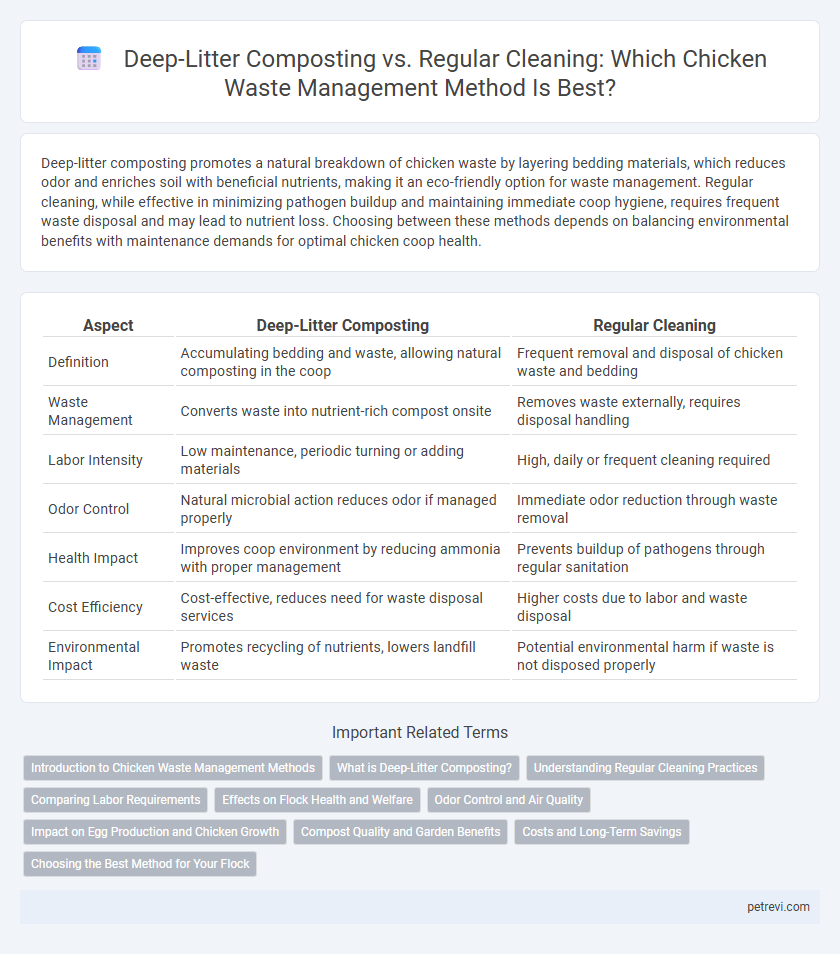Deep-litter composting promotes a natural breakdown of chicken waste by layering bedding materials, which reduces odor and enriches soil with beneficial nutrients, making it an eco-friendly option for waste management. Regular cleaning, while effective in minimizing pathogen buildup and maintaining immediate coop hygiene, requires frequent waste disposal and may lead to nutrient loss. Choosing between these methods depends on balancing environmental benefits with maintenance demands for optimal chicken coop health.
Table of Comparison
| Aspect | Deep-Litter Composting | Regular Cleaning |
|---|---|---|
| Definition | Accumulating bedding and waste, allowing natural composting in the coop | Frequent removal and disposal of chicken waste and bedding |
| Waste Management | Converts waste into nutrient-rich compost onsite | Removes waste externally, requires disposal handling |
| Labor Intensity | Low maintenance, periodic turning or adding materials | High, daily or frequent cleaning required |
| Odor Control | Natural microbial action reduces odor if managed properly | Immediate odor reduction through waste removal |
| Health Impact | Improves coop environment by reducing ammonia with proper management | Prevents buildup of pathogens through regular sanitation |
| Cost Efficiency | Cost-effective, reduces need for waste disposal services | Higher costs due to labor and waste disposal |
| Environmental Impact | Promotes recycling of nutrients, lowers landfill waste | Potential environmental harm if waste is not disposed properly |
Introduction to Chicken Waste Management Methods
Deep-litter composting involves layering chicken waste with bedding material, promoting natural microbial decomposition that reduces odor and provides nutrient-rich compost. Regular cleaning requires frequent removal and disposal of manure to maintain hygiene but may increase labor and waste management costs. Both methods impact environmental sustainability, odor control, and manure utilization in poultry farming.
What is Deep-Litter Composting?
Deep-litter composting is a sustainable chicken waste management method where bedding materials such as straw or wood shavings accumulate and decompose naturally over time within the coop. This process promotes microbial activity that breaks down manure into nutrient-rich compost, reducing ammonia levels and minimizing labor. Compared to regular cleaning, deep-litter composting enhances soil fertility and lowers environmental impact by recycling chicken waste more efficiently.
Understanding Regular Cleaning Practices
Regular cleaning practices in chicken waste management involve frequent removal of manure and soiled bedding to maintain hygiene and reduce ammonia buildup. This approach helps prevent disease proliferation and promotes better air quality within poultry houses by minimizing pathogen exposure. Consistent cleaning schedules are essential for controlling odor and supporting the overall health and productivity of the flock.
Comparing Labor Requirements
Deep-litter composting significantly reduces labor requirements by allowing organic chicken waste, bedding, and manure to accumulate and decompose naturally over time, minimizing the need for frequent cleaning. Regular cleaning demands intensive daily or weekly removal of waste, increasing labor hours and physical effort. This sustainable approach not only cuts labor costs but also enhances nutrient recycling for farm soil.
Effects on Flock Health and Welfare
Deep-litter composting enhances flock health by maintaining beneficial microbial activity that reduces pathogens and ammonia buildup, whereas regular cleaning minimizes waste accumulation but can disrupt natural behaviors linked to bedding use. Studies show that deep-litter systems lower respiratory issues and footpad dermatitis incidences compared to conventional frequent cleaning methods. Proper management of deep-litter composting fosters healthier air quality and comfort, directly supporting improved chicken welfare and productivity.
Odor Control and Air Quality
Deep-litter composting enhances odor control by promoting aerobic decomposition of chicken waste, reducing ammonia emissions and improving air quality compared to regular cleaning methods. This approach maintains a balanced microbial environment within the litter, minimizing harmful gas buildup and respiratory irritants for poultry and farm workers. Regular cleaning, while removing waste quickly, often disrupts microbial activity and can lead to increased dust and odor release, negatively impacting the poultry house atmosphere.
Impact on Egg Production and Chicken Growth
Deep-litter composting enhances nutrient recycling and maintains stable litter conditions, promoting better chicken growth and improving egg production compared to regular cleaning methods. Regular cleaning can disrupt beneficial microbial populations, potentially increasing stress and reducing productivity in laying hens. Studies show that effective waste management through deep-litter systems supports healthier birds and higher egg yield by optimizing environmental quality and reducing pathogen load.
Compost Quality and Garden Benefits
Deep-litter composting produces nutrient-rich, well-aerated compost that enhances soil fertility and supports robust plant growth, unlike regular cleaning which often results in less biologically active waste. The gradual decomposition in deep-litter systems fosters beneficial microbial activity, improving compost quality and garden nutrient cycling. This method reduces waste removal frequency and provides a superior organic amendment for sustainable gardening practices.
Costs and Long-Term Savings
Deep-litter composting reduces labor and disposal costs by allowing chicken waste to decompose naturally within bedding, minimizing the need for frequent cleaning and external waste handling. Regular cleaning involves higher recurring expenses due to daily waste removal, bedding replacement, and increased water use. Over time, deep-litter systems provide long-term savings by producing nutrient-rich compost that improves soil health and reduces fertilizer costs.
Choosing the Best Method for Your Flock
Deep-litter composting enhances nutrient recycling by allowing chicken waste, bedding, and organic matter to decompose gradually, generating heat that controls pathogens and reduces odor. Regular cleaning, involving frequent removal and replacement of bedding, minimizes disease risk but requires more labor and increased bedding material costs. Selecting between deep-litter composting and regular cleaning depends on flock size, management capacity, and environmental conditions to optimize health and sustainability.
Deep-Litter Composting vs Regular Cleaning for Chicken Waste Management Infographic

 petrevi.com
petrevi.com